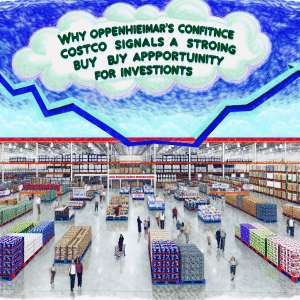Costco Wholesale Corporation (NASDAQ: COST) continues to cement its status as a powerhouse in the retail sector, making it an essential consideration for long-term, low-volatility investors. Recent data underscores why this membership-only warehouse giant remains a cornerstone for portfolios seeking steady growth and resilience amid market turbulence.
Solid Sales Growth Amid Economic Uncertainty
Costco reported an impressive 8% increase in net sales for the retail month of June, reaching $26.44 billion for the five weeks ended July 6. This momentum extended through the first 44 weeks of the fiscal year, with net sales hitting $227.46 billion, up from $210.55 billion the previous year. These figures reflect not just growth but robust consumer demand, even as inflationary pressures and supply chain challenges persist.
What stands out here is Costco’s ability to maintain strong sales growth without succumbing to the volatility that plagues many retail stocks. This resilience is a testament to its unique business model—offering a curated mix of branded and private-label products that deliver value and quality to its loyal membership base. The company’s focus on essentials like food, beverages, and groceries ensures steady foot traffic and repeat purchases, a critical factor during uncertain economic cycles.
Expert Endorsements and Price Targets
Oppenheimer’s Rupesh Parikh recently reaffirmed a Buy rating on Costco, setting an ambitious price target of $1,130. This bullish outlook aligns with the broader market consensus recognizing Costco’s stability and growth potential. Additionally, financial commentator Jim Cramer has highlighted Costco’s strategic product mix as a key driver of its sustained success.
What Sets Costco Apart?
Beyond the numbers, Costco’s strategic advantage lies in its membership model, which creates a recurring revenue stream and builds strong customer loyalty. In a retail landscape increasingly dominated by e-commerce giants, Costco’s physical warehouse experience and bulk-buying incentives offer a tangible value proposition that digital-only models struggle to replicate.
Moreover, Costco’s operational efficiency and inventory management have enabled it to navigate inflationary pressures better than many competitors. This operational discipline not only protects margins but also positions Costco to capitalize on shifts in consumer behavior, such as increased demand for bulk purchases and value shopping.
The Broader Market Context: AI Stocks vs. Retail Stability
While Costco shines as a low-volatility, long-term investment, it’s worth noting the contrasting opportunities in the AI sector. Some investors might find higher upside potential in AI stocks, especially those benefiting from geopolitical trends like onshoring and tariff adjustments. For example, certain undervalued AI companies are poised to gain significantly from these dynamics, offering a compelling complement to a stable retail holding like Costco.
Actionable Insights for Investors and Advisors
-
Diversify with Stability and Growth: Incorporate Costco into portfolios as a core holding for stability and steady growth, especially in uncertain economic periods. Its membership model and essential product offerings provide a defensive moat.
-
Monitor Consumer Trends: Keep an eye on Costco’s sales data as a barometer of consumer spending health. Strong performance here often signals resilience in broader retail and consumer sectors.
-
Balance with High-Growth Sectors: While Costco offers safety, pairing it with high-growth AI stocks can optimize portfolio returns. Look for AI firms that benefit from macroeconomic trends like reshoring and technological innovation.
-
Prepare for Inflation Impacts: Costco’s success in managing inflationary pressures can serve as a model. Investors should seek companies demonstrating similar operational efficiencies.
What’s Next?
Looking ahead, Costco’s ability to innovate within its warehouse club model—such as expanding e-commerce capabilities and enhancing private-label offerings—will be critical. Investors should watch for strategic moves that could further solidify its market leadership. Meanwhile, the evolving geopolitical landscape suggests that blending retail stalwarts with tech-forward AI investments could be the winning formula for diversified portfolios in 2024 and beyond.
Unique Insight: A Recent Statistic to Watch
According to the National Retail Federation, warehouse clubs like Costco saw a 12% increase in membership renewals in Q1 2024, outpacing many traditional retail formats. This trend underscores growing consumer preference for value and bulk purchasing, reinforcing Costco’s growth trajectory.
For investors seeking a blend of safety and growth, Costco remains a top-tier choice. Yet, the savvy investor knows that coupling such stable stocks with emerging sectors like AI can unlock superior returns. As always, stay tuned to Extreme Investor Network for exclusive insights that go beyond the headlines.
Source: Oppenheimer Remains Bullish on Costco (COST)

